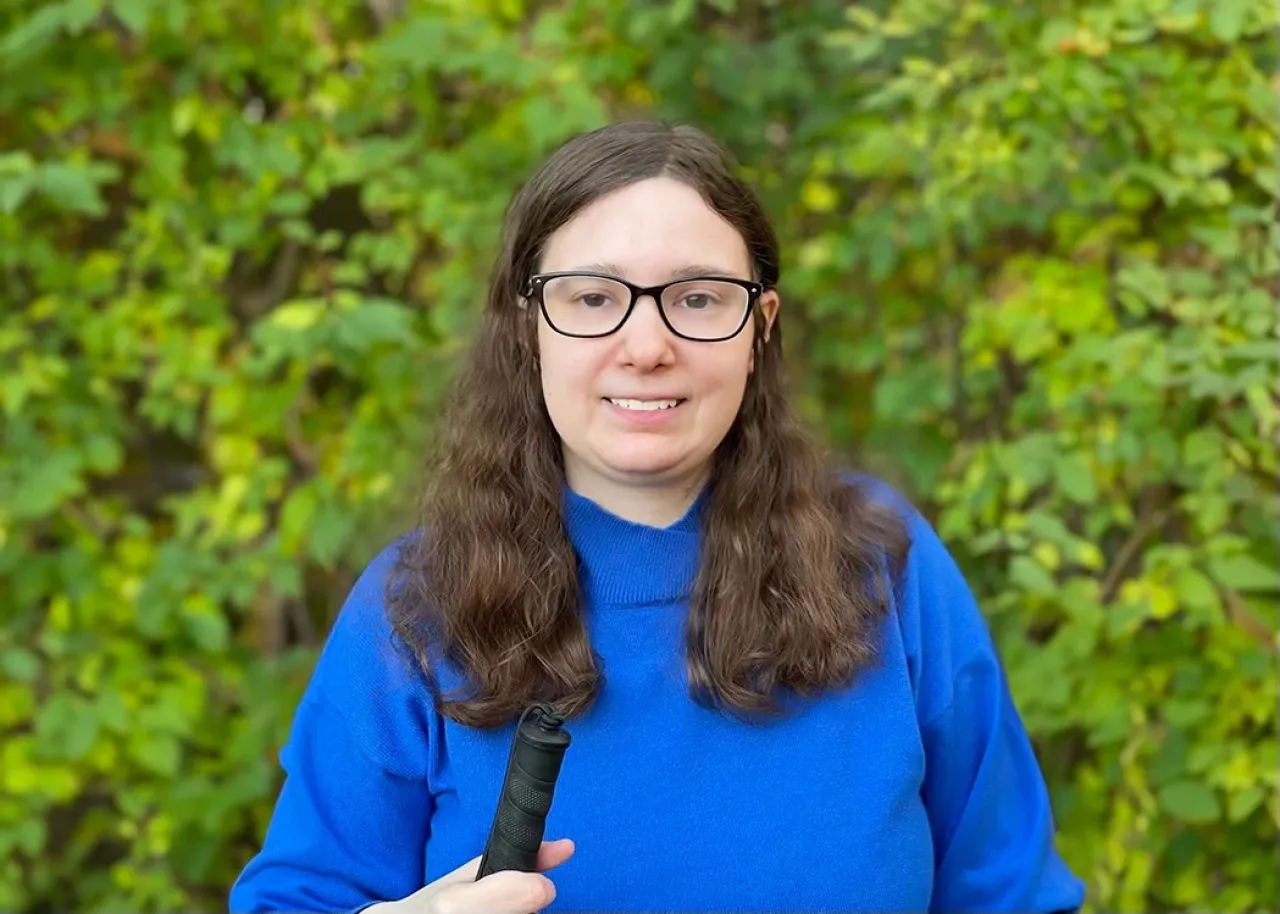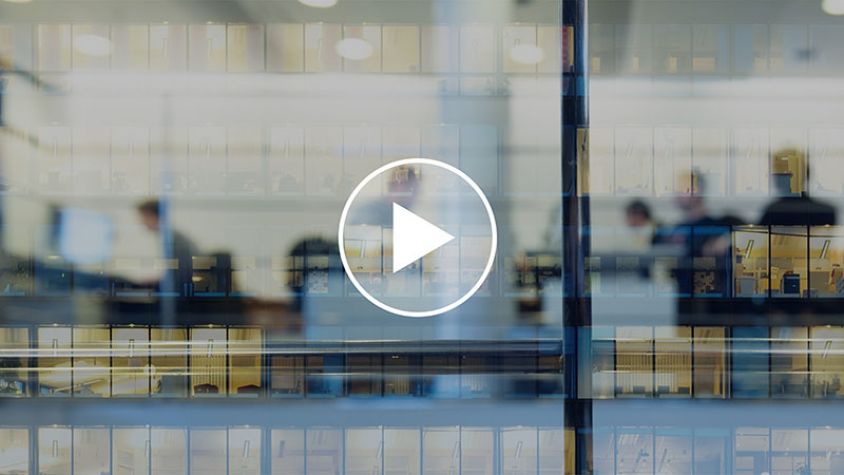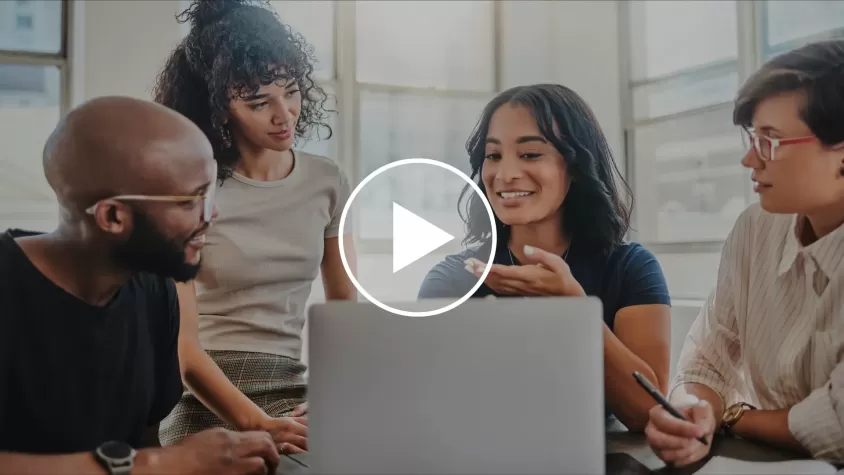Discovering new opportunities with CAI Neurodiverse Solutions
What was your background prior to CAI?
When I was a child, I showed characteristics of autism spectrum disorder. I did not make eye contact, I had sensory issues with taste of foods, and verbal communication was a challenge. I also had trouble seeing in the dark. I read at a second-grade level in kindergarten. I played soccer, swam, and played the piano. Then in high school, I was trying to do geometry and I just couldn't see it. My mom took me to many eye doctors, and when I was around 15 or 16, I found that I had a rare genetic mutation called Biedl-Bardet Syndrome, and it caused Retinitis Pigmentosa, which means that I'm legally blind. This syndrome impacts the whole body, especially vision, metabolism, and mental capacity.
I had to start using a magnifier, which included a light bulb to help with light. And in college, I had to use a screen magnifier for my computer because it was getting hard to see the screen. My college, Indiana University—Purdue University at Indianapolis (IUPUI) provided me a magnifier called Zoom Text. This was a huge help. It helped me to get my degree in English with a minor in computer science in 2017.
What did your career path look like?
I began attending a program hosted by a non-profit organization in Indiana. The program teaches visually impaired people skills like cooking, Braille, mobility, computer skills, and more. I went into that program for a couple months, and then I volunteered at their assistant technology place. I helped blind and visually impaired people figure out how to use a screen reader for computers and tablets.
How did you find CAI Neurodiverse Solutions and what is your current role?
During those 3 years of volunteering, I just wasn't having luck finding the right fit for a job. My neurodiversity affects the way I think, how I perceive the world, and how I respond to people and situations in my life. I have a little trouble with expressing my thoughts and sometimes speaking up for myself.
It was a vocal rehabilitation counselor who told me about CAI Neurodiverse Solutions because she knew someone who worked here. I applied and completed the Talent Discovery Session (TDS), and it was very exciting when I was hired into the program. I just couldn’t believe it. I learned through this process that I like to test accessibility, but I also learned that I’d need to use a screen reader daily because my vision has deteriorated.
I work with the healthtech company enGen ↗ as a Quality Assurance Analyst. In my role, I test the website to make sure it’s accessible to read, especially for those who use screen readers, and I update documentation.
I have several accommodations that allow me to do my job. For example, I use the JAWS computer screen reader program to navigate the computer, I have a special keyboard with high contrast keys that I can easily see, and I use a large, TV-sized monitor. I use my screen reader and navigate the screen, making sure each webpage is compatible with accessibility standards because all individuals should be able to use the internet. This includes reviewing all the content of a webpage, like headings, carousels, body copy text, and more. I first label what kind of copy is on the webpage, then I review the webpage once more and see what passes as compliant. I flag anything that doesn’t pass so it can be updated. I have an incredible memory and I’m good at problem solving. These qualities have helped me do my job because I can easily remember all the guidelines for digital accessibility and apply them to my testing process.
What’s the best part of your job?
I kind of love everything. I love my team—they’re very supportive. Another blind co-worker helped me to learn how to best use Microsoft Teams, which was really helpful. I enjoy going to team meetings and am open to answering any questions my team members may have about my visual impairment. My CAI Team Lead, Kimberly Acri, has shared with me that I’ve been described by my managers as a positive team player, punctual, hardworking, and intelligent.
I enjoy helping enGen make sure their websites are compliant. I’d say because of my personal situation, I’m more sensitive to the needs of neurodivergent individuals, especially those who are visually impaired. Computers are an important tool for neurodivergent people. I want to help make the computer accessible for everyone and I am glad I found a job that allows me to assess websites for digital accessibility. I am a first-hand example of a person who requires digital accessibility to do my job as well as day-to-day activities. As a person who is neurodivergent, I benefit from the work that I do at CAI.
It’s been almost 10 years since my diagnosis, but I do really well with day-to-day activities and my work responsibilities. Even though I’m blind, I do like visual things. My mom says I try to use most of the vision I do have left, and I feel like CAI has been a huge support of my ongoing journey. I am very grateful for that.
“I have thoroughly enjoyed getting to know Christine. Christine always has a positive attitude, and she is willing to try and learn new things. Christine is determined to figure out a way to make things work for her in using her screen readers and adapting it to other applications. I feel that Christine is the best person to test the digital accessibility of applications, and I’m happy that she was placed in this position. Christine is an amazing person to work with and she motivates me by seeing what she is capable of overcoming and all that she has accomplished.”
To learn more about the successful partnership between CAI Neurodiverse Solutions and enGen, read our client success story or watch the video, Moving forward with CAI Neurodiverse Solutions.



